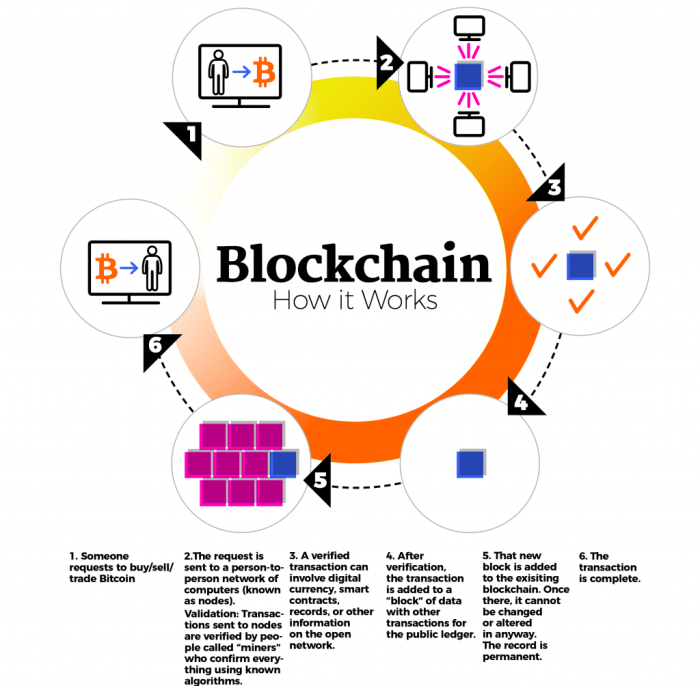How Blockchain and Crypto Are Changing the Supply Chain Industry sets the stage for this enthralling narrative, offering readers a glimpse into a story that is rich in detail and brimming with originality from the outset.
Blockchain technology is reshaping how supply chains operate, while cryptocurrencies like Bitcoin are revolutionizing payment methods. Let’s dive into the exciting world of blockchain and crypto in the supply chain industry.
Overview of Blockchain in the Supply Chain Industry

Blockchain technology has been making waves in the supply chain industry by offering a secure and transparent way to track the movement of goods from production to delivery. This revolutionary technology is changing the way companies manage their supply chain processes by providing a decentralized and immutable ledger for recording transactions.
Benefits of Blockchain in the Supply Chain
- Enhanced transparency and traceability: Blockchain allows for real-time tracking of products, enabling companies to verify the authenticity and origin of goods.
- Improved security: The decentralized nature of blockchain makes it difficult for fraudsters to manipulate data, ensuring the integrity of the supply chain.
- Cost savings: By streamlining processes and reducing the need for intermediaries, blockchain helps in cutting down costs associated with supply chain management.
Companies Utilizing Blockchain in the Supply Chain Industry
-
Walmart:
The retail giant has implemented blockchain technology to track the movement of food products, improving transparency and reducing the time taken to trace the origin of contaminated products.
-
IBM:
IBM’s Food Trust platform uses blockchain to enhance food traceability, allowing retailers and consumers to track the journey of food products from farm to table.
-
Maersk:
The shipping company has partnered with IBM to create TradeLens, a blockchain-powered platform that digitizes supply chain processes and improves efficiency in global trade.
Benefits of Implementing Blockchain in Supply Chain

Blockchain technology offers numerous advantages when it comes to supply chain management. Let’s dive into how blockchain enhances transparency, traceability, and reduces fraud and errors in supply chain operations.
Enhanced Transparency and Traceability
Blockchain provides a decentralized and immutable ledger that allows all stakeholders in the supply chain to access real-time information. This transparency ensures that every transaction and movement of goods is recorded and can be traced back to its source. As a result, companies can easily track the origin of products, verify authenticity, and ensure compliance with regulations.
Reduction of Fraud and Errors
By utilizing smart contracts and cryptographic verification, blockchain technology minimizes the risk of fraud and errors in supply chain operations. Smart contracts automate processes and payments based on predefined conditions, eliminating the need for intermediaries and reducing the potential for human error or manipulation. Additionally, the immutability of blockchain data prevents unauthorized modifications, enhancing the security and integrity of the supply chain.
Role of Cryptocurrency in Supply Chain Transactions: How Blockchain And Crypto Are Changing The Supply Chain Industry

Cryptocurrency plays a significant role in revolutionizing supply chain transactions by offering a secure and decentralized payment method that eliminates the need for intermediaries.
Cryptocurrency for Secure Transactions, How Blockchain and Crypto Are Changing the Supply Chain Industry
- Blockchain technology ensures that cryptocurrency transactions are transparent, tamper-proof, and secure, reducing the risk of fraud or data manipulation.
- Cryptocurrencies like Bitcoin provide a fast and cost-effective way to transfer funds across borders, making international transactions more efficient.
- Smart contracts powered by cryptocurrency enable automated and self-executing agreements, streamlining the payment process in the supply chain.
Impact of Cryptocurrency on Payment Methods
- Traditional payment methods in the supply chain often involve delays, high fees, and manual processes. Cryptocurrencies offer instant transactions at lower costs, enhancing overall efficiency.
- Adoption of cryptocurrency in supply chain transactions can lead to increased transparency, traceability, and accountability, as each transaction is recorded on the blockchain.
- Cryptocurrencies provide an alternative to fiat currencies, reducing dependency on centralized financial institutions and enabling direct peer-to-peer transactions.
Cryptocurrency in Cross-Border Transactions
- Cryptocurrencies like Bitcoin have the potential to simplify cross-border transactions by eliminating currency conversion fees and reducing transaction times.
- Blockchain technology ensures the security and immutability of cross-border payments, minimizing the risk of fraud or errors during international transactions.
- Using cryptocurrency in cross-border supply chain transactions can improve liquidity management and optimize working capital, benefiting businesses operating on a global scale.
Challenges and Risks of Adopting Blockchain and Crypto in the Supply Chain Industry
Implementing blockchain technology in the supply chain industry comes with its own set of challenges and risks that companies need to navigate carefully.
Challenges in Implementing Blockchain Technology
One of the main challenges companies face when implementing blockchain technology in the supply chain is the lack of standardization and interoperability. Different blockchain platforms may not be compatible with each other, making it difficult to establish a unified system across the supply chain.
- Lack of standardization and interoperability between different blockchain platforms.
- Integration with existing legacy systems can be complex and time-consuming.
- Cost of implementation and maintenance of blockchain technology.
- Resistance to change from stakeholders within the supply chain.
Risks Associated with Using Cryptocurrency
Using cryptocurrency for supply chain transactions introduces certain risks that companies need to consider to ensure the security and integrity of their operations.
- Volatility in cryptocurrency prices can lead to financial losses during transactions.
- Regulatory uncertainty and compliance issues related to cryptocurrency transactions.
- Potential for fraud and cyberattacks targeting cryptocurrency holdings.
- Lack of recourse in case of disputes or transaction errors in cryptocurrency transactions.
Cybersecurity Threats in Blockchain-based Supply Chain Systems
While blockchain technology offers enhanced security features, there are still cybersecurity threats that can pose risks to supply chain systems using blockchain.
- 51% attacks where a group of miners control the majority of the network’s mining power, compromising the integrity of the blockchain.
- Smart contract vulnerabilities that can be exploited by malicious actors to manipulate transactions.
- Data breaches that expose sensitive information stored on the blockchain to unauthorized access.
- Supply chain attacks targeting vulnerabilities in blockchain networks to disrupt operations or steal valuable data.
